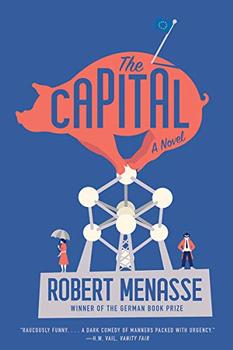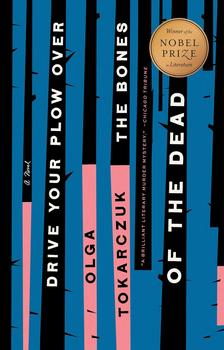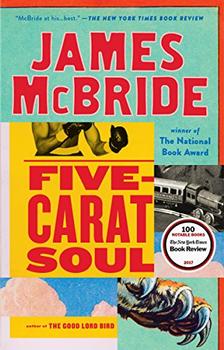Summary | Excerpt | Reviews | Beyond the book | Read-Alikes | Genres & Themes | Author Bio

A Novel
by Robert MenasseWinner of the 2017 German Book Prize, Robert Menasse's The Capital is a remarkably clever satire on global bureaucracy, recently published for the first time in English with translation by historian Jamie Bulloch.
In a bid to strengthen its reputation in a climate of Euroscepticism, the E.U. plans to mark its 50th anniversary with a special celebration event. Fenia Xenapoulou, the ambitious Greek-Cypriot directorate of the Department of Culture, sees an opportunity to shine and volunteers to take up the reins on the Big Jubilee Project; a responsibility she is quick to offload onto her subordinate Martin Susman. Martin's resulting proposal places Auschwitz at the center of the celebrations in an attempt to highlight European commonality over the resurgence of nationalistic populism, and hopefully compel an increasingly divided Europe to unite.
Elsewhere, a mysterious Polish man with dual identities is fleeing Brussels, an ailing police inspector investigates a hushed up murder case, and an elderly gentleman begins his life in a retirement home. More surreally, a large pig is spotted hurtling around the city streets, but no one is able to track down this porker on the lam. These seemingly disparate threads gradually overlap to tell a broader story of unrest in Brussels.
Menasse demonstrates how hubristic eurocrats warp the ideals of the common market in pursuit of personal prestige and another leg up on the political ladder. Rather than discuss any significant issues that directly affect their disenfranchised citizens, these policy makers are busy playing glorified party planners and having lengthy debates about why it isn't fair that when people google the European People's Party, their first result is the identically acronymed European Pig Producers. As Martin Susman discovers while buying a pair of long johns for a trip to wintry Poland, even underwear has to comply with extensive E.U. guidelines.
One of the novel's running jokes is the Union's seeming derision of the humanities. Fenia Xenapoulou echoes the wider sentiment within the commission when she declares her own department "a meaningless ministry without a budget or any weight...without influence or power." She goes so far as to declare her promotion from lowly officer within Trade to directorate of Culture as a "demotion, a career slump, a rejection." One suspects this is Menasse contending that it's no wonder government officials are so out of touch with the people when even the enriching joy of reading fiction is deemed "crazy" by these dignitaries. Indeed, Fenia's only incentive to pick up a novel is to impress the president of the E.U. She skims through the leader's favorite book in the hope she'll gain brownie points should it come up in conversation.
And yet, for all his jibes and needling, Menasse clearly has a deep-rooted affection for what the E.U. represents at its core. The Auschwitz celebrations may be a cynical political ploy to curry favor with the public, but the continual references to the Holocaust and its survivors demonstrate how easily feuding nations can lead to genocide and why a federation is needed to safeguard and unify European citizens. As Martin declares, the E.U. is meant to be "a guardian of the lessons of history."
The Capital is far from being a doorstopper, yet that doesn't stop the Austrian author crowding his pages with a cast of thousands, with new names popping up well into the third act. It is therefore difficult to keep up with all the dramatis personae or evolve attachment to any singular character.
The denouement is also deliberately lackluster. Storylines fizzle out rather than end with a bang, reflecting how in a world of rolling news, today's hot political headline is all but forgotten by the next week. While that may be true to modern life, it does feel a little unsatisfying in fiction. Nevertheless, The Capital is a multi-faceted novel of ideas that will inspire great debate about the E.U.'s evolving role in contemporary Europe.
![]() This review was originally published in The BookBrowse Review in June 2019, and has been updated for the
April 2020 edition.
Click here to go to this issue.
This review was originally published in The BookBrowse Review in June 2019, and has been updated for the
April 2020 edition.
Click here to go to this issue.

If you liked The Capital, try these:

Drive Your Plow Over the Bones of the Dead
by Olga Tokarczuk
Published 2020
In a remote Polish village, Janina devotes the dark winter days to studying astrology, translating the poetry of William Blake, and taking care of the summer homes of wealthy Warsaw residents. Her reputation as a crank and a recluse is amplified by her not-so-secret preference for the company of animals over humans.

by James McBride
Published 2018
Exciting new fiction from James McBride, the first since his National Book Award–winning novel The Good Lord Bird.
Heaven has no rage like love to hatred turned, Nor hell a fury like a woman scorned.
Click Here to find out who said this, as well as discovering other famous literary quotes!
Your guide toexceptional books
BookBrowse seeks out and recommends the best in contemporary fiction and nonfiction—books that not only engage and entertain but also deepen our understanding of ourselves and the world around us.